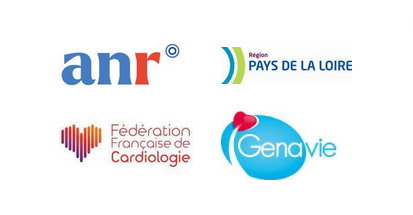Pathophysiology of inherited cardiac arrhythmias
Investigators: Flavien Charpentier, Michel De Waard, Isabelle Baró, Jean-Baptiste Gourraud, Nathalie Gaborit, Jérôme Montnach, Bárbara Ribeiro, Mickaël Derangeon, Gilles Toumaniantz
PhD students: Matthias Dereli, Serena Hachem, Aline Rio
Support staff: Imen Fellah, Agnès Hivonnait, Agnès Tessier, Pauline Tesson
This program is mainly focused on the study of genetically-inherited cardiac arrhythmic diseases, in close collaboration with team I and the Reference Centre for Hereditary or Rare Cardiac Rhythm Disorders from Nantes University Hospital and APHP (Paris).
Sudden Cardiac Death (SCD) is one of the major causes of death in developed countries. In most cases, SCD results from ventricular fibrillation, which occurs spontaneously or results from ventricular tachycardia. SCD may occur in a structurally diseased heart (myocardial infarction, dilated or hypertrophic cardiomyopathy, heart failure…), but also in normal hearts where mutations on gene encoding ion channel subunits are most often at the origin of the lethal ventricular arrhythmia. These genetically-inherited arrhythmias are rare diseases but often affect children and young adults with dramatic effects in the affected families and society. Basic research on the mechanisms of arrhythmias, the identification of the key channel level subunits involved and the clarification of their interactions are essential for designing strategies to improve patient management and prevent SCD. In addition, insights gained from studying rare arrhythmic diseases may have implications for more prevalent cardiac diseases where the affected ion channels exhibit altered expression and/or function such as heart failure, where SCD accounts for about half of all deaths.
In this context, our team combines cellular models, mainly cardiomyocytes derived from the patients' induced pluripotent stem cells, and genetically-modified mouse models to investigate the molecular mechanisms of various rare cardiac arrhythmic diseases, such as the Brugada syndrome, the long QT syndrome, progressive cardiac conduction defects and the recently described generalized ST-segment depression syndrome. These models are also used to identify and test the efficiency of new therapeutic approaches. In addition, efforts have been launched at functionally characterizing ion channel variants using high throughput technologies, such as automated patch clamp.
Learn more about our projects
- ANR WIRES : Flavien Charpentier (2023-2027)
- ANR NaCaR : Flavien Charpentier (2019-2025)
- ANR CARDIAG : Michel De Waard (2022-2025)
A consistent arrhythmogenic trait in Brugada syndrome cellular phenotype. Al Sayed ZR, Jouni M, Gourraud JB, Belbachir N, Barc J, Girardeau A, Forest V, Derevier A, Gaignerie A, Chariau C, Cimarosti B, Canac R, Olchesqui P, Charpentier E, Schott JJ, Redon R, Baró I, Probst V, Charpentier F, Loussouarn G, Zibara K, Lamirault G, Lemarchand P, Gaborit N. Clin Transl Med 2021;
Gap-134, a Connexin43 activator, prevents age-related development of ventricular fibrosis in Scn5a+/- mice. Patin J, Castro C, Steenman M, Hivonnait A, Carcouët A, Tessier A, Lebreton J, Bihouée A, Donnart A, Le Marec H, Baró I, Charpentier F, Derangeon M. Pharmacol Res. 2020
KCNQ1 Antibodies for Immunotherapy of Long QT Syndrome Type 2. Maguy A, Kucera JP, Wepfer JP, Forest V, Charpentier F, Li J. J Am Coll Cardiol. 2020
RRAD mutation causes electrical and cytoskeletal defects in cardiomyocytes derived from a familial case of Brugada syndrome. Belbachir N*, Portero V*, Reda Al Sayed Z, Gourraud JB, Dilasser F, Jesel L, Guo H, Wu H, Gaborit N, Guilluy C, Girardeau A, Bonnaud S, Simonet F, Karakachoff M, Pattier S, Scott C, Burel S, Marionneau C, Chariau C, Gaignerie A, David L, Genin E, Deleuze JF, Dina C, Sauzeau V, Loirand G, Baró I, Schott JJ, Probst V, Wu JC, Redon R#, Charpentier F#, Le Scouarnec S#. Eur Heart J 2019. equal contribution as first author; #equal contribution as senior author
Arrhythmias precede cardiomyopathy and remodeling of Ca(2+) handling proteins in a novel model of long QT syndrome. Montnach J*, Chizelle FF*, Belbachir N, Castro C, Li L, Loussouarn G, Toumaniantz G, Carcouët A, Meinzinger AJ, Shmerling D, Benitah JP, Gómez AM, Charpentier F, Baró I. J Mol Cell Cardiol 2018; 23: 13-25. *equal contribution as first author; #equal contribution as senior author
Funding
- ANR
- Région Pays de la Loire
- Fédération Française de Cardiologie
- Fondation Genavie






